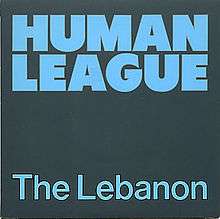The Lebanon (song)
| "The Lebanon" | ||||
|---|---|---|---|---|
 | ||||
| Single by The Human League | ||||
| from the album Hysteria | ||||
| B-side | "Thirteen" | |||
| Released | 23 April 1984[1] | |||
| Format | 7" single, 12" single | |||
| Recorded | 1984 | |||
| Genre | Synthpop, new wave, synthrock | |||
| Length | 4.09 | |||
| Label | Virgin | |||
| Writer(s) | Philip Oakey and Jo Callis | |||
| Producer(s) | Chris Thomas and Hugh Padgham | |||
| The Human League singles chronology | ||||
| ||||
 |
The Lebanon
|
| Problems playing this file? See media help. | |
"The Lebanon" is a song by the British synthpop group The Human League, released as a single in April 1984. Written jointly by lead singer Philip Oakey and keyboard player Jo Callis, it was the first single from the band's fourth album Hysteria, and was recorded at AIR Studios between 1983-1984.
Background
The song was conceived, written and recorded at a time when the band was under considerable pressure to follow up the enormous international success of their previous album, Dare. The band had taken up residence in the £1000 a day AIR Studios; they were there a full year and were agonizing (and arguing) over every note of every track.[2]
With its heavy use of bass and rock guitars, "The Lebanon" was a radical departure from the established synthpop sound of the Human League. Though the song does employ some keyboards, the use of guitars by the band was not lost on music critics who brought up the "no guitars rule" that the band had publicly adopted in 1981.
The lyrics were an attempt to make a statement on the Lebanese civil war which had been exacerbated by Israeli invasion of southern Lebanon of 1982. In a television interview, Human League member Philip Adrian Wright commented that Oakey's politically-charged lyrics were written specifically about the Sabra and Shatila massacre.[3] Human League singer Susan Ann Sulley said of the song that the band "wanted to speak up for the little people" and say something about the situation in Lebanon at the time, and that the band was not trying to be political for the sake of it.[4] The band were criticized at the time for being banal and "out of their depth",[5] but in a retrospective review, AllMusic journalist Andy Kellman wrote that the song "looks atrocious on paper but sounds fantastic".[6] In 2007, the lines "Before he leaves the camp he stops, He scans the world outside, And where there used to be some shops, Is where the snipers sometimes hide" were voted as the ninth-worst lyrics of all time, in an NME reader poll.[7] Oakey took the criticism in good humour.
"The Lebanon" was released as a UK single in April 1984. It failed to replicate the Top 3 success of the band's previous singles "(Keep Feeling) Fascination" and "Mirror Man", only reaching number 11 in the UK Singles chart[8] and number 64 in the Billboard Hot 100, becoming their lowest-charting single ever in the United States.[9] The track has frequently been played by the band live and is nearly always on their set list.
Promotional video
The music video for the song was filmed in the The Theatre Royal, London in March 1984. The video at first sight appears to be filmed at a Human League concert with the band playing live on stage. The concert was in fact staged and was filmed in takes as the band mimed to playback. The audience were invited extras and bit part dancers were placed in the front of the stage. This is very noticeable when the camera pans onto the audience where certain extras desperately try to play up for their 'shot at fame'.[2]
Even though it was a faux concert, the band's appearance on stage is notable for its layout and behaviour. The three vocalists are in a straight line at the front of the stage, a very energetic Susan Sulley on the left, a serious Philip Oakey in the centre and a cool, laid back, sashaying Joanne Catherall on the right, with the instrumentalists to the rear. This arrangement and performance style is still often used when the band plays live.
References
- ↑ "Human League, The - The Lebanon (Vinyl) at Discogs". Discogs.com. 1984-04-23. Retrieved 2013-07-11.
- 1 2 Human League Biography - www.League-online.com/Bio
- ↑ "The Human League (Adrian Wright) - Interview". YouTube. Retrieved 2013-07-11.
- ↑ Susan Ann Gayle Interview 2005 Virgin Records (Best Of DVD)
- ↑ No 1 Magazine 1984
- ↑ Kellman, Andy (2011-07-16). "Hysteria - The Human League : Songs, Reviews, Credits, Awards". AllMusic. Retrieved 2013-07-11.
- ↑ "Worst lyrics of all time revealed!". Nme.com. 2007-05-04. Retrieved 2013-07-11.
- ↑ "Artist Chart History - The Human League". Official Charts Company. Retrieved 22 June 2013.
- ↑ "The Human League - Chart history". Billboard.com. Retrieved 7 August 2014.